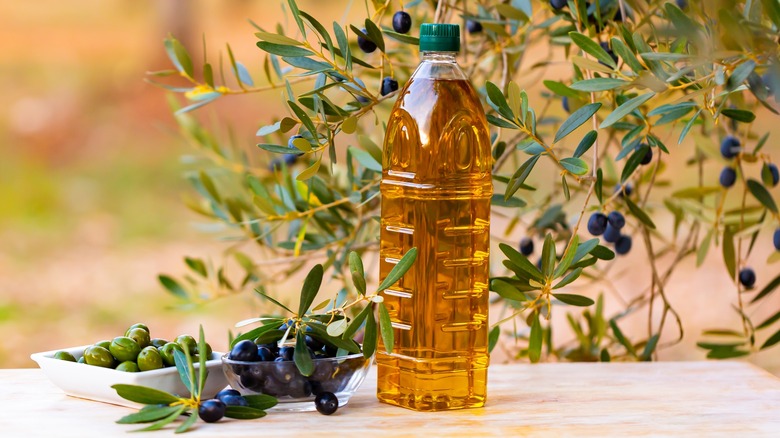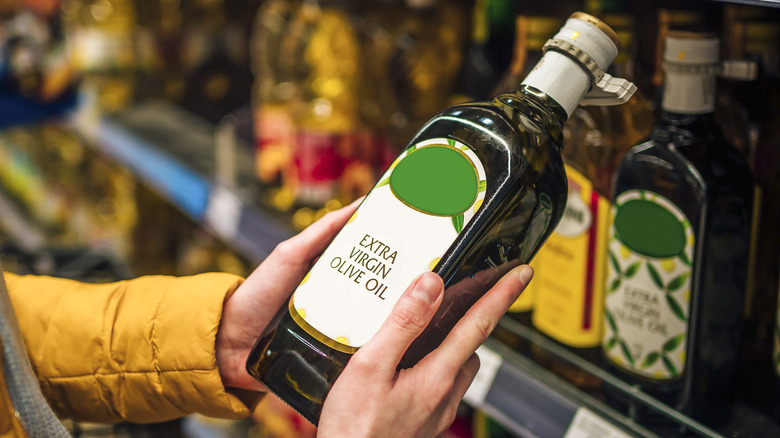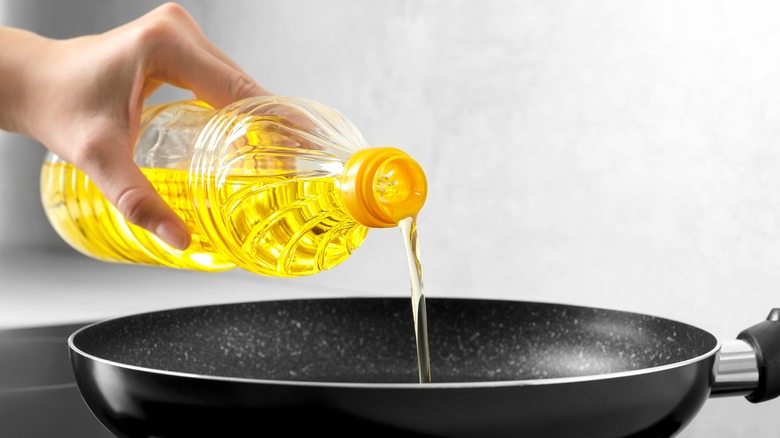Should You Be Storing Olive Oil In Plastic Bottles?
Olive oil has been part of the human diet for more than 6,000 years. Early on, it was kept in clay vessels called amphorae, but glass bottles became the container of choice a few millennia later. Go to a grocery store today and you'll see plenty of olive oil sold in glass, but lots of plastic containers, too. While plastic is prized for its affordability and convenience, there's much debate whether newer is better when it comes to olive oil.
The lightweight nature of plastic is definitely a boon. Bottles are easier to pick up and use in the kitchen than heavier glass ones, and plastic also contributes to a lower price point. Heavy glass bottles are more expensive to produce and transport, which is reflected in a higher cost to consumers. However, it turns out that the good old practice way of storing olive oil in glass can't really be improved on, no matter how convenient plastic may be.
Olive oil is highly sensitive to its environment, and will quickly degrade based on storage conditions. Plastic is a more porous material than glass, which means it doesn't provide as sturdy of a barrier between the oil and its surroundings. This can result in degradation of an oil's flavor and nutritional content, and according to some studies, plastic bottles might even pose risks to your health. This makes it a definite olive oil mistake to avoid on your next grocery trip.
Why glass beats plastic for olive oil
The biggest reason why glass is better for olive oil is because it's protective and non-permeable. There are three key environmental factors that impact the quality of olive oil: light, temperature, and oxygen. When left to sit in a place that's too sunny or warm, and/or in a container that lets oxygen in, the oil spoils much faster, impacting its flavor, aroma, and nutritional content. Extreme changes like sudden temperature shifts speed up decay, as well.
Environment damage may result in your olive oil tasting bitter and unpleasant, or appearing cloudy. It might also lose some of its healthy organic compounds and antioxidants, such as oleocanthal, which can help reduce inflammation in the body. Most olive oils will eventually go rancid about 18 to 24 months after bottling, but packaging plays an important role in preserving it for as long as possible.
Whether you're picking up a bottle from the store or buying an olive oil cruet, glass containers are best for shutting out damage that the oil might undergo in the average home kitchen. This can include ultraviolet rays coming through the windows, or ambient heat from cooking appliances. Porous plastic would let that light and heat in, not to mention oxygen as well. This permeability means that your oil will eventually oxidize and spoil, while sturdy glass keeps it stable. Darkly-tinted glass is preferable to block out light, but even clear glass is a step up from plastic of any shade.
Most health risks of plastic olive oil bottles
Microplastics are another source of health concerns related to storing olive oil in plastic. A 2014 study by UC Davis demonstrated that small molecules from plastic can migrate into olive oil, diminishing its quality and food safety. Further research is needed to understand the consequences of ingesting microplastics, but a 2023 study in Yonsei Medical Journal showed that consumption can stimulate the release of endocrine disruptors, which may cause reproductive system disorders. Glass, on the other hand, is a natural, nontoxic material that is chemically inert. This means that its molecules don't migrate into liquid or solid foods.
Another aspect of plastic bottles can also threaten your health. Regardless of the material of the bottle, you should never store olive oil by the stove. This is especially crucial for plastic bottles. Exposure to high temperatures radiating off your stove or oven will not only accelerate spoilage in your olive oil; it also speeds up the degradation of plastic, according to a 2008 study by the International Association on Water Pollution Research and a 2020 study by Acta Biomed.
When plastic overheats, a contaminant called antimony can transfer from the container to its contents. While studies on this subject are mainly about water in plastic bottles, antimony is proven to cause damage to the respiratory and gastrointestinal systems (via World Health Organization). You won't want to risk it either way with your olive oil.



